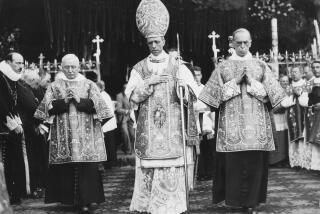Rebel’s Letters Show Peru Siege as Bid to Reunite Family
- Share via
LIMA, Peru — The government painted him as a fanatic motivated by greed, but letters show that Nestor Cerpa Cartolini, who led the band of guerrillas that seized the Japanese ambassador’s residence here, was also inspired by love.
In letters sent to his two sons during the four-month hostage crisis that followed, Cerpa said one of his main goals in taking the captives was to win freedom for his imprisoned common-law wife and guerrilla comrade, Nancy Gilvonio, and to reunite his family.
“If I one day leave this Japanese residence, it will be because I made what you want and dream a reality: to have your mother out of prison and for you to be able to see her, touch her and be spoiled in her arms once again,” Cerpa, 43, said in a letter to his sons, Nestor, 10, and Juan Carlos, 3.
That letter was dated April 13, when Cerpa and 13 other rebels of the Tupac Amaru Revolutionary Movement had been holding 72 hostages for nearly four months.
The intermediary for the correspondence, published Friday in La Republica newspaper, was Roman Catholic Archbishop Juan Luis Cipriani, who mediated between the government and the rebels during the standoff.
The crisis ended with an April 22 military raid and the deaths of Cerpa, the other rebels, two government commandos and a hostage.
The boys live with relatives while Gilvonio serves a life sentence in Peru’s harsh Yanamayo prison. She was arrested in November 1995 and convicted of taking part in a thwarted Tupac Amaru plot to seize Peru’s Congress and take hostages.
The government scoffed at early reports that Cerpa’s takeover of the Japanese residence was motivated by a desire to see his wife and close friends freed from prison, saying he was a publicity-seeking fanatic.
But Cipriani, who befriended Cerpa while acting as mediator, added credibility to reports that Cerpa was motivated by a desire to reunite his family.
“I’m especially in solidarity with your mother,” Cerpa wrote to his sons, “because . . . because you need her by your side, and there is no other way to get her out of prison.”
More to Read
Sign up for Essential California
The most important California stories and recommendations in your inbox every morning.
You may occasionally receive promotional content from the Los Angeles Times.










